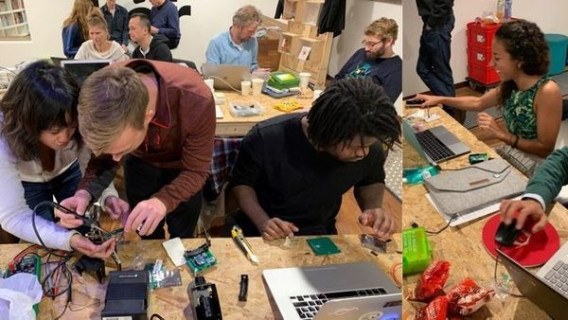Always wanted to learn to 3D-print or lasercut, as to create a practical object or a beautiful piece of art?
Join us at the Makerspace of the Public Library for a free worskhop (check the website for what you need to bring & prepare!)

Always wanted to learn to 3D-print or lasercut, as to create a practical object or a beautiful piece of art?
Join us at the Makerspace of the Public Library for a free worskhop (check the website for what you need to bring & prepare!)
Get notified about new updates, opportunities or events that match your interests.

During this evening Paul Stefaan Mooij will introduce the DIY Smart Glasses he developed, he is bringing several 'arms'. The PMSG kit lets you swap out those boring old arms from your (sun)glasses for a custom-made PCBA that looks and functions like something a hacker MacGyver would dream up. It fits just like the original—using the same hinges, screws, and probably duct tape somewhere—but now you’ve got space for sensors, connectors, and all the IoT magic you can pack onto your temples.
Join us to experiment, learn and envision new sensors and possibilities.
https://www.hackster.io/psmooij/pmsg-prototype-modular-smart-glasses-8bd4e6
https://github.com/Control-C/PMSG
You don't have to rsvp via meetup, the workshop is from 19-21h in the Makerspace of the OBA and you can just walk in!
OBA: Oosterdokskade 143, 1011DL Amsterdam

Join us to learn to understand the concept of Meshtastic, an open source, off grid, decentralized, mesh network build to run on affordable low-power devices!
Prepare and configure your own device as to contribute to Amsterdam wide coverage, or just for fun / to chat:-)
The workshop is based on this device: https://nl.aliexpress.com/item/1005007752194012.html Of course you may bring a different device, it only might take a little extra effort on your part if the settings are different. We will try to help of course!
You don't have to rsvp via meetup, the workshop is from 19-21h in the Makerspace of the OBA and you can just walk in!
OBA: Oosterdokskade 143, 1011DL Amsterdam

For our end-of-the year event we have some extra opportunities to build, create and even program your own souvenir to take home!
Please if you want to make and take home the Xmas lights you see in the picture, the kit costs 25,- (we also have 2 Pay-It-Forward kits). Of course you can also work in other small projects or 3D print a small Xmas tree or make (for children!) a self designed wooden lamps!
You don't have to rsvp via meetup, the workshop is from 19-21h in the Makerspace of the OBA and you can just walk in!
OBA: Oosterdokskade 143 1011DL Amsterdam

